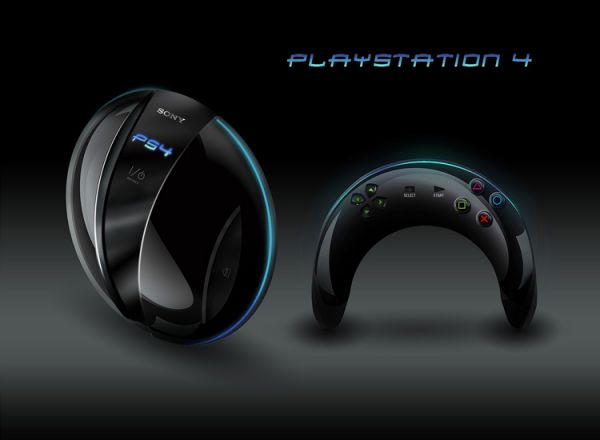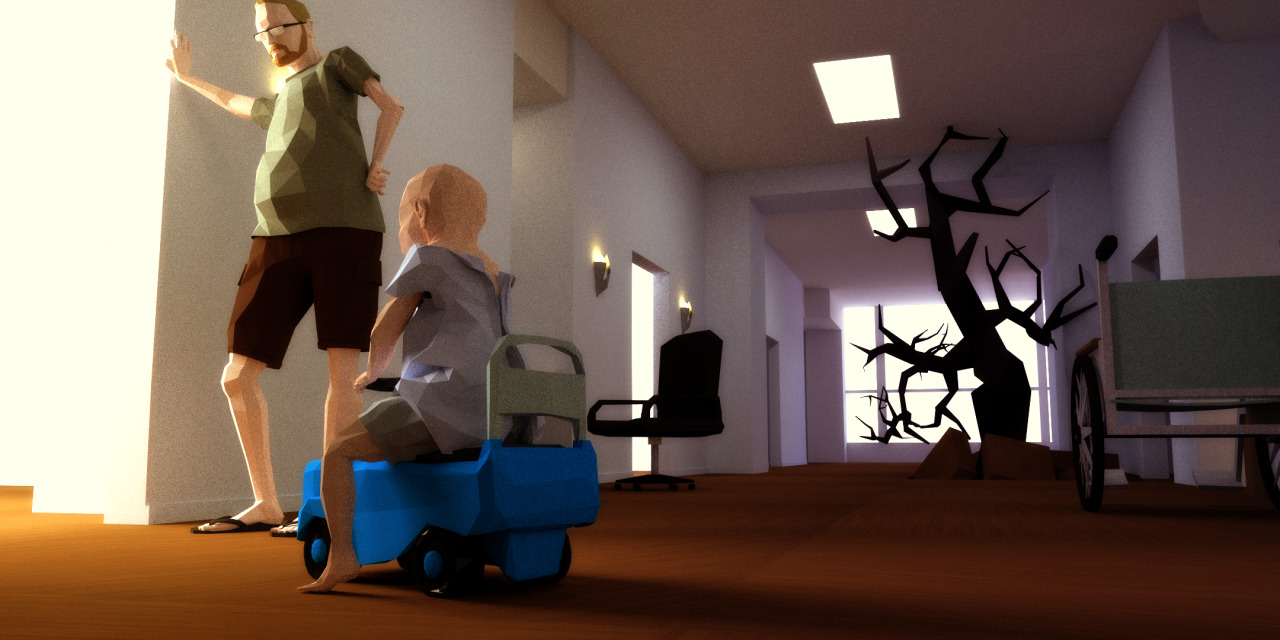
Cover Shot (Exact original image source uncertain)
(Note: I am aware that the picture may well be the result of some person's imagination.)
---------------------------
SOME DISCLOSURES
Firstly, I am not a frequent consumer of console hardware or console games. However, I do acknowledge their appeals though, especially that of consoles being mainly dedicated gaming hardware.
Personally, I am wary of the proprietary restrictions that come with being a (legitimate) consumer of console products, but I do recognize the conveniences that are provided by these, such as being able to send faulty hardware for refurbishment (albeit for a fee), as well as the ease of design that developers get from having to work with systems with specific (albeit somewhat limited) technical designs.

I also find this very convenient for moving a player character about a 2D plane.
In other words, I am a lot more open to console gaming than you would think.
---------------------------
A HOPE FOR MORE VARIETY IN GAME PRODUCTS
First things first: the technical designs of console machines will make it likely that game designs eventually hit a technological barrier. When this may happen is debatable, of course, but it is difficult to argue that it won't happen for certain. Besides, there had been generations of console machines that are more sophisticated than their forebearers that came along to usurp their predecessors as the dominant products in the console hardware markets, thus making it difficult to refute this claim.

Non-game products are intended to extend the life cycle of console machines.
Of course, I am aware that console-makers are resorting to adding non-game-related functionalities to the console machines. However, this effectively turns them into general home entertainment devices, away from their roots as dedicated gaming machines. This may not be pleasing to puritan gamers of course, but any wise person would realize that these people are no longer the target customers of console-makers.
Personally, I am in favor of these decisions of the console-makers, as the console machines have the technical prowess to support applications other than just gaming. I find it wasteful if all those electronics are dedicated to only segment of digital entertainment. Yet, even these non-gaming applications will hit the aforementioned design barrier eventually.
That said, returning to the matter of next-generation consoles, having consoles that are more advanced than the current-generation ones would allow for even more applications, which of course means more variety of entertainment options to be had for the customer.
Perhaps more importantly, more advanced technology allows for more sophistication in the games that would be designed for these machines. Of course, this statement is ultimately just a forecast, based on examination of previous generation consoles and their games. One could argue that the only improvements so far have only been aesthetics, though another can argue that games that were once limited to the computer platforms are already appearing on the consoles, namely the shooters, the simpler ones of the real-time strategy genre and of course turn-based strategy games.
On the other hand, it remains to be seen whether consoles would be just playing catch-up with the computer platforms or not when it comes to offering variety in games.
It would be easy to presume that next-generation consoles will be more technologically sophisticated in order to offer more variety in games and non-game products. However, there is the doubt that there are ...
UNCERTAINTIES IN DESIGNS AND OFFERING OF GAMES ...
Now, I am not one to have no skepticism and be all "glass half-full" - or "all-full", if I would be deluded enough to think that there cannot possibly be any issues when I do not have any information or guarantee that nothing could go wrong.
(Yes, there are people like these - namely those that say that "console-makers have learned lessons from the past" or that "the next-gen consoles won't be expensive" when they do not have any concrete data to support these claims.)
The only way to clear these doubts is by having more information on these next-generation consoles, but all there are to be had seem to be merely unverifiable statements and images that may or may not even be true.

Hopefully, the differences that next-generation consoles have compared to their predecessors are not just only aesthetic. (Orbis is not entirely confirmed to be the PS4.)
There is little if anything concrete on the designs and specifications of the next-generation consoles that Sony Entertainment and Microsoft Games are developing, and whatever claims there are, if they are true, only pertain to designs that are still on the figurative drawing board.
Then, there are the games that would come in the wake of these would-be new consoles. Looking back at the history of past generation of consoles, console-makers made use of launch line-ups of games that are convincingly different from those for previous-generation ones to market their new consoles with.
The Wii U, if it can be considered a next-generation console (and there are many opinions that express doubt at this or even outright denial), could be seen as having failed to do this.

After all, the confirmed titles for the Wii U include many games that have already debuted on other platforms, or are continuations of franchises that have been around for a long time.
There is a silver lining to the Wii U's line-up of games, of course, such as ZombiU, which has a control option that I find somewhat refreshing, namely moving the Wii-U gamepad around for finer aiming, as opposed to using only analog sticks (which I do not consider to be practical enough for this purpose). Moreover, the usual control options for console games are still there on the gamepad, e.g. the usual D-pad layouts and analog sticks.
[video=6396424]
The use of two screens (one on the TV and the other on the gamepad) may allow for features that are infrequently seen in video games, like tracking and manipulating two objects of interest separately and independently of each other (which is a feature that some games for Nintendo's current handhelds have done already, I am aware, and perhaps which the VITA and PS3 would do).
I am very much aware of the jeers that these are just "gimmicks", if you are thinking that I do not. However, I would say here that if not for these gimmicks, console machines would just be playing catch-up with the computer platforms, as suggested earlier. (I am also aware that the more snobbish of PC elitists would love to keep claiming this.)
Without these gimmicks, there would be nothing to differentiate games on console platforms from those on the computer platforms. Of course, others (likely the same snobbish PC elitists) can argue that whatever the console platforms can do, the computer platforms can do, but I am not seeing any concerted effort by hardware- and game-makers to develop the same gimmicks for the computer games market (for which the same snobs would say that these gimmicks are not wanted, of course).
(Side note: Much of what the more outspoken of PC elitists say are bitter, sanctimonious and exaggerated arguments that are often not substantiated by hard data and unarguably relevant facts, by the way.)
It remains to be seen if Nintendo and its game-making partners would utilize the potential behind the Wii U's gimmicks, but if Nintendo wants the Wii U to be as successful as its predecessors, it had better provide support for game-makers who have ideas for the Wii U, and not just help them port existing IPs over to the platform.
... AND UNCERTAINTY IN COST INFLUENCES ON DESIGN AND PRICING
With more advanced technology, the new consoles would be more expensive than previous consoles which use older technology. This is a difficult-to-deny statement.
Of course, one can argue that the next-generation consoles would likely use technology that had debuted years earlier to cut costs, much like what had been done for the current-generation ones, but they would still likely have price tags that are higher than the current price tags of current-generation consoles (which have since dropped in asking price since their launch, by the way).
If this is so, this will ever pose a hurdle in getting consumers who are used to the current-generation consoles' prices to buy the next-generation ones.
A (rather naive) person could say that console-makers would sell the next-generation consoles at a loss to cut down its asking price and spur sales, while compensating by making money off the software products for the consoles. The same person would point to the past (again) to bolster this claim.
But here's a catch (I like saying this, I admit): the next-generation consoles have to offer products that have not been offered for previous- and current-generation consoles in order to be seen as offering something new. Otherwise, it would be seen as just recycling things that have already been done before.
Another catch is that investors may not allow this to happen. The likes of Sony Entertainment have sold some of their consoles at losses, promising investors that there would be pay-offs down the line from having a wider customer base for its software products. Although this move certainly did not turn out disastrous (at least for the PS3), the pay-offs have not been consistently substantial either, upon examination of Sony's yearly financial statements and the segments on its Sony Entertainment subsidiary.
Of course, if one is to look at somewhat-related facts, Nintendo appeared to have persuaded its investors to allow it to do this for the Wii U, citing the same promise of compensating by software sales (albeit this was reworded as "combining sales of hardware and software"). However, it remains to be seen if Sony and Microsoft can do the same without investors baulking and thinking that their executives have gone bananas.

On a not-entirely-unrelated note, this is popularly thought to be a hint at Donkey Kong, but the kanji above him (which Iwata said is a reference to Nintendo's work culture that is oriented around "creating something unique" - and another Donkey Kong game is certainly not "unique") may suggest that this is a sarcastic jab by Nintendo's leadership at its skeptics.
... AND DOUBTS OVER WHAT REALLY IS "NEXT-GENERATION"
I believe that the worst outcome that could happen is that the next-generation consoles are not really more technologically advanced. They might turn out to be just repackaging and restructuring of existing console technology in some new shell.
(Having gimmicks in addition is not the worst outcome to me. At least the gimmicks make the console remarkable, for better or worse; this is still better than recycling, which would be boring.)
I know, it is quite difficult to believe that this can happen for Sony's or Microsoft's next-generation consoles - but we do not have any guarantee that this would not happen, do we?
Using the example of the Wii U again, it has been argued, such as by the likes of Bitmob, that the Wii U is only "next-generation" because it is a successor to the Wii, and does not have other "qualifications" of being next-generation, such as having convincingly "better" technical specs than the PS3 or Xbox 360, and that its main difference is it having gimmicks in its control options.
Then, there are counter-arguments - usually by Nintendo's supporters, such as Nintendo Life - that the next-generation is "about the experience", that is, the utilization of gimmicks for gaming experiences that are more than just a single lonely gamer holding a conventional controller in one's hands and sitting on a couch.
I am using a lot of quotation marks here, because those who are putting forth these arguments do not seem to be aware that there is no empiric definition of what is "next-generation", much less any consensus. They are making unilateral definitions of what is "next-generation" as they see fit.

That there are all sorts of outlandish concept art for the next-generation is, to me, another indicator that people don't really know what "next-generation" really is, if it is anything other than a loosely-coined term.
---------------------------
ANOTHER HOPE: MORE OPTIONS AND FREEDOM FOR CONSUMERS
Personally, I consider consumer-friendliness to be the most important aspect of any product.
Unfortunately, this aspect is also the reason that I am not too eager to peruse some console-makers' products - specifically Microsoft Games' and Sony Entertainment's. (You may want to notice that I am referring to specific subsidiaries of the corporations that are Microsoft and Sony.)
Neither of them has gained my confidence. The legal agreements that customers have to accede to in order to receive services from either of them require customers to use their products in ways that are only sanctioned by Sony Entertainment or Microsoft Games, or else lose privileges for customer support and online services (i.e. Sony's PSN and Microsoft's Xbox LIVE), as well as face possible lawsuits if they publicly reveal ways to use their consoles that are not condoned by either console-maker.
I cannot stomach these (especially the lawsuits), and therefore when I was faced with the "take-it-or-leave-it" deals that they have, I leave. That is not to say that I haven't used their products before though - I thank my friends for letting me mooch off them for an hour or two with some console games that caught my interest.
Therefore, it is my hope that Sony Entertainment and Microsoft Games would at the very least, be like Nintendo when it comes to relationships between customers and them, i.e. being laid-back, having their figurative hands off the customer and letting the customer do whatever he/she wants with the console machines.
Otherwise, the likes of Ouya can always claim to be "better" than what they can offer, despite criticisms that arise from Ouya's requirements that its games be either "free-to-play" or demos, to cite just one perceived setback (which I do not personally see as a problem, but I know some other people do).
After all, Ouya is having collaborations with open-source organizations like XBMC and Google Android - something that remains unheard of for Sony Entertainment's and Microsoft Games' consoles (or at least not that I know of; I am having difficulty finding info for any such collaborative project for the Xbox or Playstation).

These two mascots might never appear next to the logos for the Xbox or Playstation.
I am not saying that I would be supporting Ouya whole-heartedly and without reservations; besides, I didn't contribute to its Kickstarter project. However, I can say that I have far less aversion to Ouya than I would PS4/Orbis or the XBox 720/Durango, which I expect Sony Entertainment and Microsoft Games to shackle with stifling legal agreements.
---------------------------
That's all that I would write for now. I may update this blog post with more things if you would leave a suggestion. That said, happy Thanksgiving, Deepavali and Muharram for anyone who are celebrating/observing them!






























Log in to comment